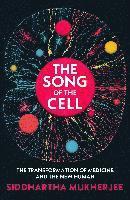
endast ny
The Song of the Cell
In the late 1600s, a distinguished English polymath, Robert Hooke, and an eccentric Dutch cloth-merchant, Antonie van Leeuwenhoek, look down their hand-made microscopes. What they see introduces a radical concept that alters both biology and medicine forever. It is the fact that complex living organisms are assemblages of tiny, self-contained, self-regulating units. Our organs, our physiology, our selves, are built from these compartments. Hooke christens them 'cells'. The discovery of cells announced the birth of a new kind of medicine. A hip fracture, a cardiac arrest, Alzheimer's, AIDS, lung cancer - all could be re-conceived as the results of cells, or a cellular ecosystem, functioning abnormally. And all could be treated by therapeutic manipulations of cells. This revolution in cell biology is still in progress: it represents one of the most significant advances in science and medicine.
Utgiven: 2022
ISBN: 9781847925985
Förlag: Random House UK
Format: Häftad
Språk: Engelska
Sidor: 496 st
In the late 1600s, a distinguished English polymath, Robert Hooke, and an eccentric Dutch cloth-merchant, Antonie van Leeuwenhoek, look down their hand-made microscopes. What they see introduces a radical concept that alters both biology and medicine forever. It is the fact that complex living organisms are assemblages of tiny, self-contained, self-regulating units. Our organs, our physiology, our selves, are built from these compartments. Hooke christens them 'cells'. The discovery of cells announced the birth of a new kind of medicine. A hip fracture, a cardiac arrest, Alzheimer's, AIDS, lung cancer - all could be re-conceived as the results of cells, or a cellular ecosystem, functioning abnormally. And all could be treated by therapeutic manipulations of cells. This revolution in cell biology is still in progress: it represents one of the most significant advances in science and medicine.
Ny bok
190 kr200 kr
5% studentrabatt med Studentapan
Begagnad bok (0 st)
Varje vecka tillkommer tusentals nya säljare. Bevaka boken så får du meddelande när den finns tillgänglig igen.



